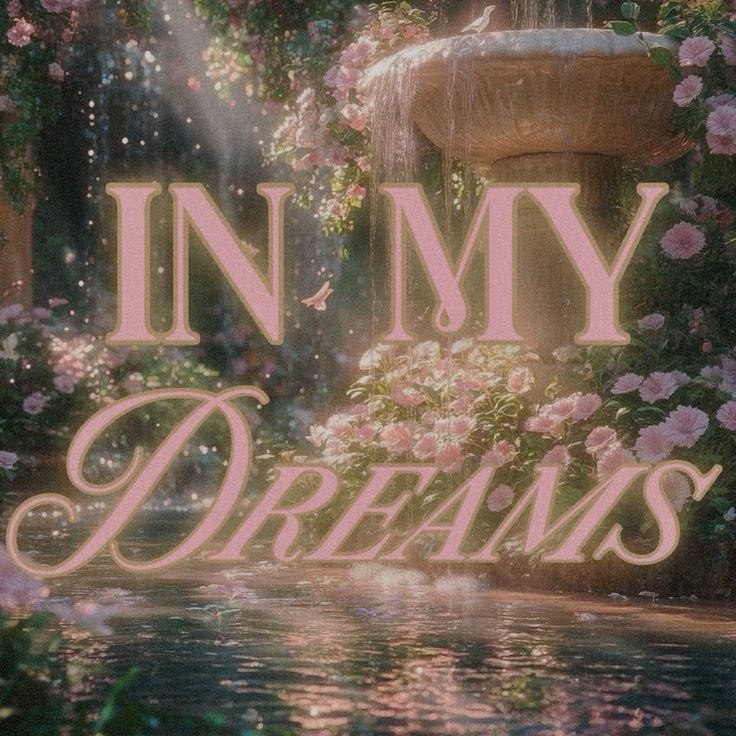You Don’t Need to Have It All Figured Out to Start Writing
If the desire is there, the story is already beginning.
✿ Did you know— I have a new 1:1 coaching program for writers! I work with emerging and debut authors to help them build sustainable creative practices, write and revise with confidence, and take meaningful steps toward publication. My 3-month coaching packages are designed to support you deeply through the current stage of your novel—whether that’s getting started and planting a seed, reworking a messy draft, or preparing to query. ✿
My agent and I plan to go out on submission with my debut novel next week. (!!!) I can not believe I’ve entered this stage of the process. As someone who is always thinking about the next step, who works so hard to stay in the moment and trust the process, it feels surreal to be stepping into this part of the publication phase, a place I had only ever dreamed of.
When turning in the draft of my book to my agent last week, a draft that is the most complete it has ever been, I couldn’t help but think of the beginning. How my precious little obsession came into being. Back in November of 2020, when I penned the first words of my very first novel, I had no idea what I was doing. But I wanted to write a book so badly, a yearning I felt deep in my gut, and so I began.
The call to write is powerful.
Even if the desire feels light, like a tiny crackle in your chest, a twitch in your fingers, an itch you can’t ignore. Or if it feels grand, that wave of inspiration that has you fumbling for your notes app so you don’t forget a line, or rushing to your keyboard or scrambling for a pen. No matter how it feels, that desire is a powerful thing.
As I’ve been working one-on-one with more writers this year, I’ve been hearing something similar. “I want to write a novel, but don’t know what to write about.”
And while I understand their frustration, I don’t think this is necessarily a bad place to be.
Writing a novel takes a long time. Even if you are a planner and an outliner, you can never actually calculate the amount of time for your story to evolve and take shape. Being open as a writer and allowing the work to guide you means understanding that there will be surprises, major cuts, and roadblocks along the way. But we welcome those, trusting in our process. Trusting that we will find our way to the end.
So with all this unexpectedness, what carries us through?
Desire ♡︎
Even in the midst of not knowing what to write about, if you long to write, if you seek to write, if you want to write a novel so badly you can almost taste it, you are already in a place of possibility. You have already begun your writing journey.
The last five years of my life have been spent working on my novel. And it was just last month that I was doing another round of tweaks and minor revisions to my draft. I have no idea what draft I’m on now, but it’s got to be close to 10 or 11. Of course, I have had my moments of wondering if this book will ever be done. I have my little temper tantrum, and then I take a deep breath and remember what I want. I remember what I’ve learned through this entire journey.
That my diligence, my perseverance, and my desire to complete this story is what has carried me through.
So, if you are in a place of possibility, meaning you want to write a novel but you aren’t sure what your story will be about, I welcome you with open arms to the novel writing club. You have already walked through the door. Let’s get you a little farther in the room.
Here are some of my tips for brainstorming and nurturing that little seed of possibility.
✿ Allow space for daydreaming
Our world is so noisy. We rarely find stillness. Even when we are still, we reach for our phones in the mere second we are not occupied. We don’t get truly bored anymore, as scrolling has taken over that brain space. But I believe our writerly selves are their happiest when we have space to daydream. Daydreaming is soft and loose. It is looking at your thoughts with curiosity instead of judgment. It’s playing around with thoughts that pop into your head with the discovery of a child. There are no “have tos” or “musts.”
Next time you are taking a walk or a drive. Or doing some easy house or yard work, or just sitting in a chair, looking out the window, I encourage you to simply wonder about what your novel could be about. Take the time to watch your thoughts like a movie, curiously, holding each idea loosely. Over the years, prioritizing daydreaming has helped me learn more about characters that felt tricky, solve plot problems, and truly see the scene I was working on. I attribute so much of my book to driving in the car, a novel playlist on, a soft, open mind, wondering and inquiring.
Let yourself daydream. It’s magical.
✿ Find the questions
Every novel is, in my opinion, an author’s attempt at answering a question. I think so often the writer starts with one question in mind and by the end of the first draft realizes there are five more connected to it. Or their original question was only the tip of the iceberg.
I know for myself that my novel started with a setting— a New England country club. A space I had inhabited as a waitress for over 10 years of my life. There were many questions attached to my experience. Questions I often wondered about myself, having a female body in such a male-dominated space. And even more questions about class and servitude. But as draft one turned to draft two and onward, there was another question that set my plot in motion: what if it really went too far? What if these interactions my characters were having actually turned out to be dangerous?
There is so much joy in writing fiction, and this is one of them. Asking the questions that led your characters into extremes.
I talked about this back in May when I got to interview my dear friend,
, for Write or Die Magazine. She said it best:If I have a question about why a character is the way they are, or what might happen if—the novel gives me the freedom to push them into situations that maybe feel familiar to me, but where I can make different choices, or explore different outcomes. And I really get to ask, what would happen if they took it all the way? Specifically, I think what I’m most interested in is when characters do the most extreme things.
So I feel like what draws me most to a novel is, here’s some emotional question that I want to explore, and here are these characters that maybe are similar to me, or have feelings that I’ve felt before, or have been in situations I’ve felt before—but their response to whatever life throws at them is the most extreme. Then it’s kind of just a domino effect of like, what happens next? How do they respond next? I always want to get someone on the page as far into a problem as possible—to see how it might blow up. What might be revealed?
Questions naturally lend themselves to more questions. Keep asking and keep playfully trying to answer. Keep a curious and open mind when you ponder what questions you have been trying to find the answers to in your life. You never know where that might take you.
✿ Mine your obsessions
If I were a little braver, I would ask every person I met, “What are you obsessed with?” I love the word “obsessed”— how weighty and profound it feels. To me, saying you are obsessed with something means you feel love for that thing on a bodily level. It lights you up inside.
My writing life changed so much when I was able to finally identify and revel in the things I had always been wholeheartedly interested in. I think sometimes we can dismiss these obsessions because they feel so familiar to us. We don’t see their true power. And by power, I mean what makes us different and unique. What makes our writing truly authentic.
For me, whenever I got stuck in those early drafting days, when I had no idea what to write, where the plot should move, or who my character was, I thought about what I would like to see on the page through the lens of my own obsessions. What movies I watched over and over again. What imagery I loved to look at, like my Pinterest board or a music video. Songs I couldn’t stop playing, or even the color palette I was always drawn to. It wasn’t until I fully accepted my complete obsession with early 90s/00s nostalgia that I set my novel in 1999, and so many other elements of the story fell into place. My book is a catalog of things I love, and yours can be too. If you are stuck on what to write, mine through your obsessions. What excites you? What do you find pleasing to look at? What are you always drawn to?
✿
I hope these ideas help get your creative brain working. The desire to write a novel is a beautiful one, and if you feel that calling, just know it is there for a reason. Even though it takes so much work and time, it is truly rewarding. And I’m not talking about publication— I’m talking about writing. The writing is where the magic is. The writing is where you transform. The writing is the point.
✩₊˚.⋆☾⋆⁺₊✧ When you are ready, here is how I can help ✩₊˚.⋆☾⋆⁺₊✧
If you desire to take your novel seriously—or just need help finding your way in—my 1:1 coaching is open to new writers. Learn more and book a session here!
You might also like:
➳ My self-guided writing reset: Fearless Writing: 8 Days to Silence Self-Doubt
or some of my most recent newsletters —








Totally agree when we are not writing our mind is working in the background!
Congrats! Yay for going on submission soon! Is now considered the cut off? I hear summer slows down so do most agents prefer not go on sub in July and August? Additionally, yesss! I usually outline but even mid-outline I stop to write and explore the characters.